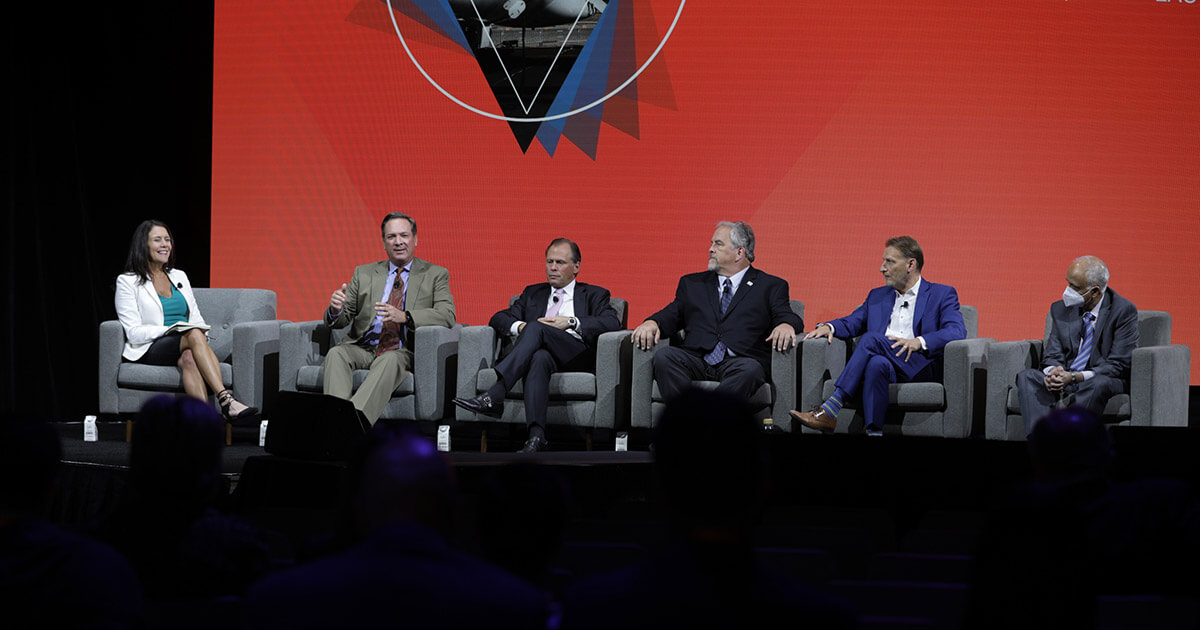Sustainability Commitments, Clean Tech Takes Center Stage at NBAA-BACE

Oct. 13, 2021
Industry leaders and outside experts Tuesday expressed complete confidence that business aviation will reach its net-zero emissions goal because of its long track record of advancing technology and the number of options that can be tapped to generate significant carbon reductions. This was the consensus view during the Business Aviation Sustainability Summit, held on the first day of the 2021 NBAA Business Aviation Convention & Exhibition (NBAA-BACE).
The summit came just hours after NBAA, General Aviation Manufacturers Association and the International Business Aviation Council pledged the industry will cut its carbon emissions in half and achieve net-zero CO2 emissions by 2050 as part of a renewed Business Aviation Commitment on Climate Change.
Sustainability has come a long way in a few short years due to the industry’s commitment, growing demand from customers, stakeholder interest in environmental, social and governance concerns, speakers said at the summit. Today, the industry is driving the global sustainable aviation fuels (SAF) market, increasing efficiency and using innovative market-based initiatives to reduce climate emissions as it pursues electric, hydrogen and other next-generation technologies that can be game changers in the future.
There was much discussion at the summit about the SAF market today and its potential in the future. SAF is an important part of industry’s sustainability push, with the potential to cut aviation’s lifecycle carbon emissions by up to 80%.
The U.S. National Renewable Energy Laboratory’s Zia Abdullah said it’s an “exciting time” for SAF because it can be made from a diverse set of sources, including food waste, algae and converting carbon dioxide to fuel. Abdullah outlined other benefits to SAF: higher performance, lower maintenance expenses and fewer of the particulate emissions that cause smog and soot.
World Energy CEO Gene Gebolys said SAF’s biggest obstacle has been demand, but increased availability has caused demand response. He compared today’s net-zero drive to the U.S.’s 1960s mission to reach the Moon. The technology needed did not exist when the mission was announced, but it was developed in response to the urgency of the effort, just as it is with climate change, he said.
Bryan Sherbacow, the president and CEO of producer Alder Fuels, said the industry has only used SAF for 6 ½ years, but it has already reached a tipping point. Still, he said, the industry “needs to push really hard” and take an “all of the above” technology approach to reach the 2050 goal.
What’s needed to accelerate the clean tech solutions? Speakers said government can be a game changer in boosting SAF production and policymakers should fund R&D, but the industry’s own leadership will go a long way to meeting growing demand. Pratt & Whitney Canada’s Delray Dobbins said manufacturers must lead the way by developing the aircraft demanded by the market.
Jay Orwin, the director of aviation for Netflix, said sustainability has received more attention and has become a bigger issue during the pandemic. This is causing demand to rise and supply will follow, which will drive down the cost of SAF, he said.
In addition to the climate announcement and the summit, sustainability is being featured throughout NBAA-BACE. The convention’s carbon-offset program has made the show make it one of the world’s largest carbon-neutral events, more than 100 exhibitors signed a Green Pledge to limit their environmental footprint at the convention, and flights in and out of Las Vegas are flying on SAF.
Any person who attends an NBAA convention, conference, seminar or other program grants permission to NBAA, its employees and agents (collectively "NBAA") to record his or her visual/audio images, including, but not limited to, photographs, digital images, voices, sound or video recordings, audio clips, or accompanying written descriptions, and, without notifying such person, to use his or her name and such images for any purpose of NBAA, including advertisements for NBAA and its programs.
Related Articles
February 27, 2024
NBAA, Industry Partners Oppose California Efforts to Regulate Jet Fuel
December 15, 2023
NBAA Welcomes Decision from Treasury on Sustainable Aviation Fuel Tax Credit; Eager for Remaining Guidance
Nov/Dec 2023
Management: No SAF at the FBO? Try Book-and-Claim
November 13, 2023


 International Business Aviation Council Ltd.
International Business Aviation Council Ltd.